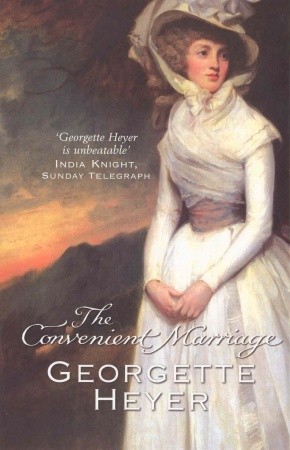 This category seems to include both worthy projects–that is demanding books one ought to read but never has–and utterly undemanding books one can take the beach and laze away with on a summer’s day. Of course, summer on the coast of Northern California is a typically cold and foggy affair, but the premise still holds, and I fall squarely in the summer reading as confection category.
This category seems to include both worthy projects–that is demanding books one ought to read but never has–and utterly undemanding books one can take the beach and laze away with on a summer’s day. Of course, summer on the coast of Northern California is a typically cold and foggy affair, but the premise still holds, and I fall squarely in the summer reading as confection category.
Top on my list is The Convenient Marriage, by Georgette Heyer, which I finished in an all-day marathon yesterday. It’s thoroughly delicious, with hints of Austen and Pym,. If you like either of these superb satirizers of English manners, Heyer is a true find. The plot hinges on the necessity of a woman of good birth but small means marrying a wealthy man to pay off the family debts–such a common theme, but with a twist. The eldest beauty, though in love with a poor lieutenant, is to sacrifice herself in marriage to the wealthy Lord Rule (perfect name). Her 17-year-old sister, not a beauty and with dark eyebrows a stutter, determines to offer a counter proposal, and goes to speak to Lord Rule herself:
“…It is because of L-Lizzie–my sister. You have offered for her, haven’t you?”
Slightly taken aback, the Earl bowed. Horatia said in a rush: “C-could you–would you mind very much having m-me instead?”
The Earl was seated in a chair opposite to her, absently swinging his eyeglass, his gaze fixed on her face in an expression of courteous interest. The eyeglass stopped swinging suddenly, and was allowed to fall. Horatia, looking anxiously across at him, saw a rather startled frown in his eyes, and hurried on: “Of c-course I know it ought to Charlotte, for she is the elder, but she said nothing would induce her to m-marry you.”
His lips quivered. “In that case,” he said, “it is fortunate that I did not solicit the honour of Miss Charlotte’s hand in marriage.”
“Yes,” agreed Horatia. “I am sorry to have to say it, but I am afraid Charlotte shrinks form the idea of m-making such a sacrifice, even for L-Lizzie’s sake.” Rules shoulder’s shook slightly. “Have I said s-something I shouldn’t?” inquired Horatia doubtfully.
“On the contrary,” he replied. “Your conversation is most salutary, Miss Winwood.”
“You are laughing at me,” said Horatia accusingly. “I daresay you think I am vey stupid sir, but indeed, it is most serious.”
“I think you are delightful,” said Rule. “But there seems to be some misapprehension. I was under the impression that Mis Winwood was–er–willing to receive my addresses.”
“Yes,” concurred Horatia. “She is is w-willing, of course, but it makes her dreadfully unhappy. That’s why I came. I hope you don’t m-mind.”
“Not at all,” said his lordship. “But may I know whether I appear to all the members of your family in this disagreeable light?”
“Oh, no!” said Horatia earnestly. “M-mama is excessively pleased with you, and I myself d-don’t find you disagreeable in the least And if only you would be so v-very obliging as to offer for m-me instead of Lizzie I should like you very well.”
Thus starts the story of the marriage of Horatia Winwood to the Earl of Rule, and it has all the elements you might want of summer novel–romance, villainy, spiteful and frivolous society on full display, a hero, a heroine, many fools, and a happy ending. I recommend it with the only reservation that Horatia’s stuttering gets rather tiring to read. One does wish she outgrew it in the course of the novel, as she does so much else. Luckily, this novel has been reprinted and is even available electronically.
I can’t wait to read more of Ms. Heyer